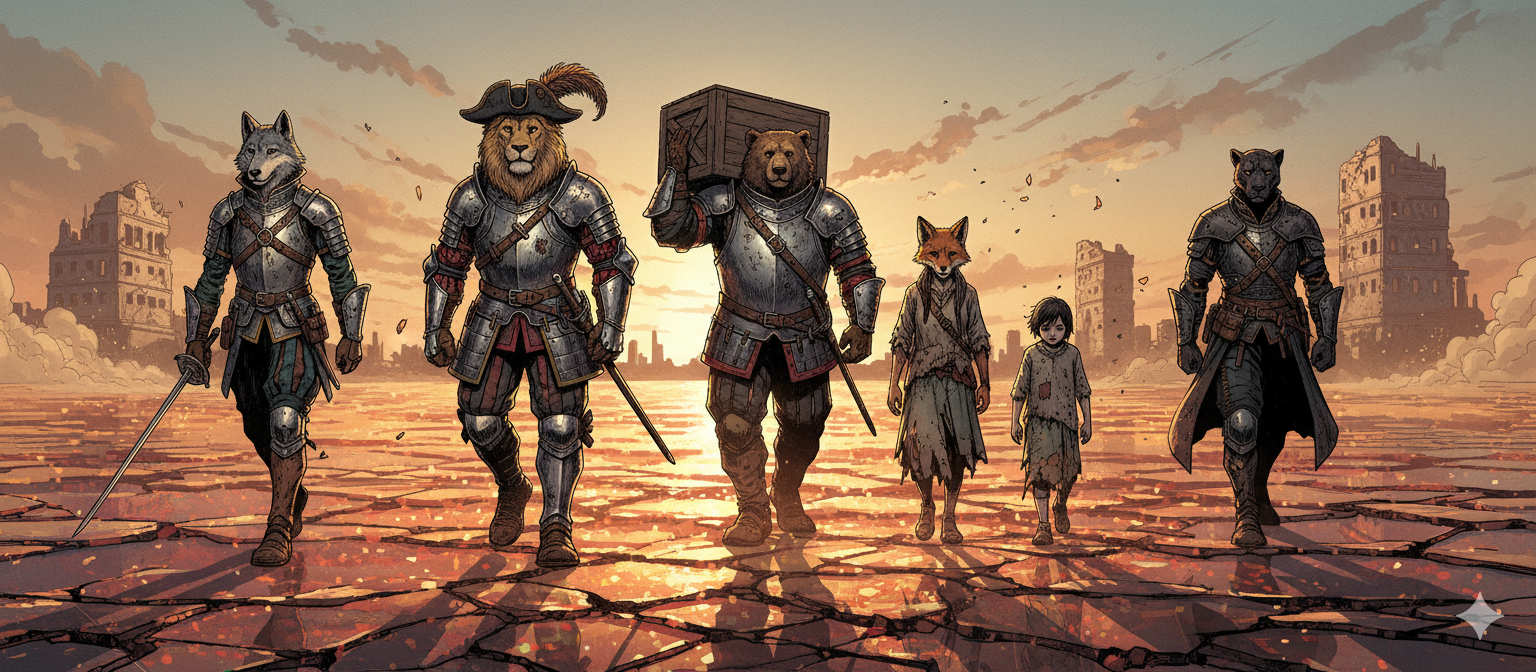Glass Horizon
The wind across the Glass Plains was a blade. It sang when it cut, whistling through a thousand fractures of fused sand, turning the horizon into a sea of mirrors and ghosts.
Dartagnan led the column, his wolf’s muzzle wrapped in cloth, musket slung low. Behind him came Athos, the lion — steady stride, shoulders squared, sunlight glinting off his half-polished cuirass. Porthos, massive and grinning even through exhaustion, hauled a crate of water on one shoulder. Aramis, the fox, walked lightly across the glass shards as if he’d been born for it. And Cassius, the panther — silent, unreadable, eyes like obsidian — trailed them, watching the rear.
Two humans followed under torn cloaks: a mother and her boy. They said nothing. The Therians didn’t ask. Some debts weren’t measured in words.
The plains shimmered, endless. Beneath their feet, the sun reflected like an open wound. Then came the sound — faint, metallic, wrong.
Athos raised a hand. “Movement,” he rumbled.
Cassius was already gone, a shadow slipping into the dunes. Moments later, a rifle cracked. The bullet sang past Aramis’ ear and buried itself in the glass.
Raiders.
Shapes rose from the dunes — scavengers in mirrored masks, their reflections scattered like illusions.
“Ambush,” Aramis hissed.
“Positions,” Dartagnan barked. “Porthos, shield the humans. Athos—on me.”
The Therians moved like a well-wound clock. Porthos dropped the crate and knelt, broad frame shielding the boy as shards shattered against his armor. Aramis vanished in the glare, reappearing behind one of the raiders long enough to drive his rapier through glass and flesh.
Athos and Dartagnan fired in unison — two shots, two kills. Smoke drifted, blue in the sun.
Then the third shot came — not theirs.
Cassius stumbled back into view, blood running down his arm, eyes blazing. “More coming. Six. Maybe eight.”
Dartagnan reloaded, voice low. “We hold the line.”
“For what?” Porthos growled. “They’ll keep coming.”
“For the code,” Athos said simply.
“The code’s not going to stop a bullet.”
“No,” Dartagnan said. “But it reminds us who we were before the fire.”
The raiders closed in. Gunfire roared. Glass exploded like thunder.
When it ended, the wind returned. The sun dipped low, red bleeding across the plains.
Three raiders fled, silhouettes shrinking into the light. Porthos stood breathing hard, fur scorched. Aramis knelt beside Cassius, who lay against a slope of melted sand, his breathing shallow.
“You’ll live,” Aramis said.
“Doubtful,” Cassius smiled faintly. “But I’ll die handsome.”
Athos chuckled once — low, deep. “You always did.”
Dartagnan turned toward the humans. The boy was crying quietly, clutching the mother’s hand.
“Go,” he said. “Follow the glass ridge east until the wind stops singing. You’ll find shade.”
The woman looked at them — at these beasts dressed like knights, standing proud among broken mirrors — and whispered, “Why help us?”
Dartagnan holstered his musket. “Because no one helped us.”
As the humans vanished into the glare, the Therians gathered their wounded and stood in silence. The plains reflected their shapes, stretching them into ghosts that watched them back.
“Glass remembers everything,” Aramis murmured.
“Then let it remember we stood,” said Athos.
The wind rose again, singing through the shards. For a heartbeat, the reflection of the five musketeers shimmered brighter than the sun — then scattered like dust.
